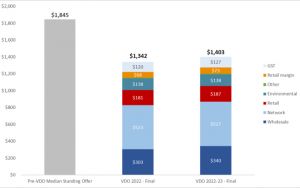Volatile market conditions are to blame for the state regulator’s decision to increase the default electricity tariff in Victoria from 1 July 2022.
The Essential Services Commission (ESC) revealed the Victorian Default Offer (VDO) will rise by about five per cent for residential and small business customers due to soaring wholesale prices weathered by energy providers recently.
Annual price increases to retail bills are expected to jump by $61 for households and $270 for small businesses.
The ESC reported that around seven per cent of households and 16 per cent of small businesses were still on the VDO across the state. This includes around 140,000 Victorians living in embedded electricity networks, such as apartment buildings and caravan parks.
Aside from wholesale costs, there are many components that make up a typical power bill, all of which were assessed before making this decision, the ESC’s pricing director, Marcus Crudden, said.
“Forecast wholesale electricity prices are driving an underlying increase. Rising wholesale prices for electricity account for almost two thirds of the increase in the default offer for households,” he said.

Despite the surge in price, the revised Victorian Default Offer is generally in line with the current rate of inflation, and 2022-23 prices remain much lower than when the VDO was first introduced in 2019, Mr Crudden noted.
“We want to make sure that those on standing offers pay prices more closely aligned to competitive market deals. Compared to 2019 and prior to the introduction of the Victorian Default Offer, 2022-23 standing offer prices come in at around $450 lower for residential customers and $2,400 lower for small business customers.”
The state’s energy regulator also reminded customers that the default offer simply provides a safety net for those less engaged in the market and that there are often cheaper deals available.
“We encourage consumers to contact their energy retailer regularly to check if they are on the best deal,” Mr Crudden added.
An increase to the VDO was first proposed by the ESC earlier this year, where it was historically revised in January.
Energy plans cheaper than the VDO
Victorians who have not switched energy providers or plans for a while may be paying more for power than they need to. That’s why it’s important to regularly compare deals to ensure you’re paying a competitive price. See how these plans stack up against the VDO or use our free comparison tool for a range of quotes specific to your area.
Here are some of the cheapest published deals from the retailers on our database that include a link to the retailer’s website for further details. These are products from referral partners†. Costs are based on the Citipower network in Melbourne but prices may vary depending on your circumstances. This comparison assumes general energy usage of 4000kWh/year for a residential customer on a single rate tariff. Please use our comparison tool for a specific comparison in your area and to see other products in our database that may be available. Our database may not cover all deals in your area. As always, check all details of any plan directly with the retailer before making a purchase decision. The next three tabs feature products exclusively from AGL, EnergyAustralia and Origin.
Here are the AGL Energy plans on our database for Victoria. These are products from a referral partner†. These costs are based on the Citipower network in Melbourne but prices may vary depending on your circumstances. This comparison assumes general energy usage of 4000kWh/year for a residential customer on a single rate tariff. Please use our comparison tool for a specific comparison in your area and to see other products in our database that may be available. Our database may not cover all deals in your area. As always, check all details of any plan directly with the retailer before making a purchase decision.
Here are the EnergyAustralia plans on our database for Victoria. These are products from a referral partner†. These costs are based on the Citipower network in Melbourne but prices may vary depending on your circumstances. This comparison assumes general energy usage of 4000kWh/year for a residential customer on a single rate tariff. Please use our comparison tool for a specific comparison in your area and to see other products in our database that may be available. Our database may not cover all deals in your area. As always, check all details of any plan directly with the retailer before making a purchase decision.
Here are the Origin Energy plans on our database for Victoria. These are products from a referral partner†. These costs are based on the Citipower energy network in Melbourne but prices may vary depending on your circumstances. This comparison assumes general energy usage of 4000kWh/year for a residential customer on a single rate tariff. Please use our comparison tool for a specific comparison in your area and to see other products in our database that may be available. Our database may not cover all deals in your area. As always, check all details of any plan directly with the retailer before making a purchase decision.
Is the VDO a good deal for Victorians?
It is unlikely that Victorians will be getting the cheapest electricity rates on the VDO, because it essentially acts as a price cap for customers who don’t regularly compare deals, Canstar Blue’s Energy Editor, Jared Mullane, said.
“Before the Victorian Default Offer was introduced in 2019, Victorians who weren’t engaging in the market were likely on expensive standing offers, so while the VDO does safeguard consumers to a degree, it usually isn’t the cheapest deal around,” he said.
“If you can’t remember the last time you switched plans or providers, then you can either compare the latest prices, or ring your current provider and ask to be placed on their best offer. It is important to act sooner rather than later, particularly as power companies are expected to continue raising their prices amid a hostile wholesale market.”
A price increase was also announced for the state’s recently introduced two-period time of use tariff.
Additionally, the ESC has increased the price cap a retailer can charge on a pay on time discount from 3.1 per cent to 5.71 per cent. This is also due to commence on 1 July 2022.

Image credit: Adam Calaitzis/Shutterstock.com, The Essential Services Commission.


Share this article